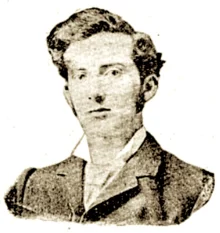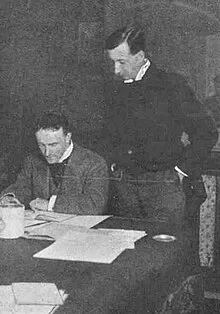Hamish MacCunn, né James MacCunn (22 March 1868 – 2 August 1916) was a Scottish composer, conductor and teacher.

He was one of the first students of the newly founded Royal College of Music in London, and quickly made a mark. As a composer he achieved early success with his orchestral piece The Land of the Mountain and the Flood (1887), and, later, his first opera, Jeanie Deans (1894). His subsequent compositions did not match those two successes, and although he continued to compose throughout his life, he became best known as a conductor and teacher. He held teaching appointments at the Royal Academy of Musicand the Guildhall School of Music.
As a conductor MacCunn served as musical director to the Carl Rosa, Moody-Mannersand D’Oyly Carte opera companies, and worked with Thomas Beecham in the latter’s London opera seasons in 1910 and 1915 and on tour.
James MacCunn was born in Greenock, Scotland, the second son of James MacCunn and his wife Barbara, née Neill. It was a musical household: MacCunn senior, a prosperous shipowner by profession, was an amateur cellist; his wife, a former pupil of Sterndale Bennett, sang and played the piano. The parents encouraged the musical development of their second son, who, alongside his general education at the Greenock Academy and elsewhere, received private lessons from local teachers in violin, piano, organ, harmony and composition.When he was eight the family spent a full season in London, where the boy was allowed to attend all August Manns’s many concerts at the Crystal Palace. In 1883, at the age of fifteen, he won a scholarship to the newly established Royal College of Music (RCM) in London.

At the RCM MacCunn studied piano with Franklin Taylor, viola with Alfred Gibson and composition with Hubert Parry and Charles Villiers Stanford. While a student he had substantial compositions premiered: the cantata The Moss Rose, performed at the RCM in 1884, and the overture Cior Mhor, which was given by Manns in a concert at the Crystal Palace in October 1885. In 1885 MacCunn adopted the first name Hamish, a Gaelic version of the name James.
MacCunn resigned the scholarship in 1886 in what the music critic John Purser describes as “a fit of pique” because he felt he was not receiving the social status due to him. He left the RCM without taking a degree. Shortly afterwards he had a success with his concert overture The Land of the Mountain and the Flood, premiered at the Crystal Palace in 1887. The Musical Times commented, “The work – which is spirited and bold in conception and brilliantly scored – was finely played and enthusiastically received”.Bernard Shaw, in his capacity as a music critic, called it “a charming Scotch overture that carries you over the hills and far away”.
Some of the composer’s songs and other works were premiered at the house of the painter John Pettie, whose daughter Alison married MacCunn in June 1889. They had one child, Fergus, who became a soldier. Pettie portrayed MacCunn in his popular painting Two Strings to her Bow (1887). From 1888 to 1894 MacCunn was professor of harmony at the RCM’s older rival the Royal Academy of Music and also took private pupils.
Discover more from WILLIAMS WRITINGS
Subscribe to get the latest posts sent to your email.